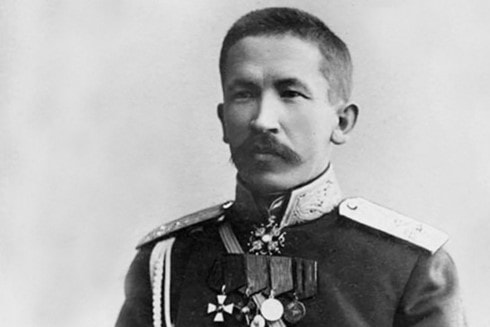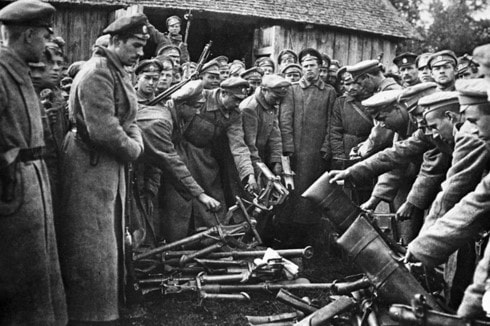Profile: The coup attempt to stop the October Revolution in Russia in 1917
In September 1917, reactionary forces attempted a military coup to eliminate the situation of two parallel governments and suppress the rising Russian revolutionary movement.
Exactly a century ago, the generalLavr Kornilov – the most famous general in the Russian army in 1917, attempted to capture the capital of the Russian Empire at that time, Petrograd, wipe out the radical Bolshevik revolutionaries and establish a far-right dictatorship. After this general failed in his plot, the victory of the Russian left-wing forces became unstoppable.
 |
| Portrait of Russian general Lavr Kornilov in 1916. Photo: Wikipedia. |
100 years ago, Russia was in chaos. After the February Revolution overthrew the monarchy, a new political system emerged. Officially, the bourgeois Provisional Government ruled the country, but in practice, it had to compete with the system of Soviets (councils formed by workers, peasants, and soldiers) supported by the extreme left Bolsheviks.
To make matters worse, Russia was still at war with Germany. The situation on the battlefield was very unfavorable for Russia. The soldiers were tired of the war and did not want to continue fighting.
The Provisional Government banned capital punishment and flogging in the army, making it difficult for Russian officers to maintain discipline. The Russian army suffered defeat after defeat.
In July 1917, the Bolsheviks attempted to seize power in Petrograd (now Saint Petersburg), but the Provisional Government suppressed the uprising. By the end of the summer, the atmosphere in Russia was still tense, and that was when General Lavr Kornilov stepped in.
Who is Kornilov?
He was the son of a common Cossack. Kornilov rose to the top of the Russian army through hard work and courage. He participated in the Russo-Japanese War (1904-1905), commanded a division in World War I, and was appointed Supreme Commander of the Russian Army in July 1917.
Kornilov enjoyed a great reputation as a war hero. High-ranking officers supported him, considering him a noble and talented man. Among these officers was General Anton Denikin, who later became the leader of the White movement and a comrade of Kornilov.
On the other hand, skeptics doubted Kornilov's military and political abilities. General Mikhail Alekseyev even said that "Kornilov has the heart of a lion but the head of a sheep", essentially criticizing him as a man of courage but no strategy.
Politically, Kornilov was a right-wing nationalist. He despised leftists, seeing them as corrupting Russia and the army. He even disliked “moderate socialists” like Alexander Kerensky, head of the Provisional Government. As for radical revolutionaries like the Bolsheviks, it could be said that General Kornilov was ready to hang them.
The coup was orchestrated by the interim government?
On the one hand, Kerensky disliked the Bolsheviks – the biggest threat to his government’s power. But on the other hand, he was also very afraid of General Kornilov. Faced with enemies on two fronts, Prime Minister Kerensky tried his best to maintain his balance and maintain power in his hands. But he failed completely.
There are different opinions about what happened before Kornilov ordered his troops to take Petrograd. According to Kornilov's supporters, it was Kerensky who ordered the army to take control of the city and suppress the Soviets and Bolsheviks.
In his memoirs, Kerensky always denied this view. He insisted that General Kornilov himself had plotted the coup and established a personal dictatorship.
Historians continue to debate this point, but author Alexander Rabinovich of “The Bolsheviks Take Power: The Revolution of 1917” argues that Kerensky was implicated in any case, as it was he who appointed the general as Commander-in-Chief of the army.
Military coup developments
On September 9, 1917, General Kornilov was in Mogilev (now Belarus), where the army headquarters was located, and ordered General Alexander Krymov's 3rd Army Corps to besiege Petrograd.
It was then assumed that the officers in the capital would follow the Bolshevik example of an uprising. According to the plan, soldiers were deployed under the pretext of maintaining order to take over the city, eliminate the far-left forces and establish a military dictatorship.
 |
| General Kornilov's soldiers surrendered and handed over their weapons. Photo: RIA Novosti. |
The next day, Prime Minister Kerensky publicly ordered General Kornilov to stop the movement of troops and resign. The general responded publicly that the government was under the influence of irresponsible elements and that he had no intention of resigning and obeying Kerensky's orders. The head of the provisional bourgeois government branded Kornilov a traitor.
General Krymov's troops were still advancing on Petrograd. Several other army generals wrote to Kornilov expressing their loyalty to him and eagerness to join the fight against the Soviets and the Bolsheviks. But the army garrison in the capital was loyal to the provisional government. Russia was on the brink of civil war.
Put down the coup
Meanwhile, the Bolsheviks, who considered both Kornilov and Kerensky enemies, were at a loss for what to do. But as Kornilov’s forces approached Petrograd, the Bolsheviks saw an imminent danger. “We will fight Kornilov,” declared Lenin, “not to support Kerensky, but to expose his weakness.”
The left concentrated its forces against Kornilov's army – which had become the most counter-revolutionary. Prime Minister Kerensky was forced to accept an alliance with the left, releasing a number of imprisoned Bolshevik leaders.
The Bolsheviks quickly mobilized workers and peasants in Petrograd to stop General Krymov's troops. Railway workers blocked roads to the capital, and postal workers cut off communications between the armies.
Bolshevik agitators confronted the soldiers and persuaded them to stop firing on workers and residents. The officers were unable to neutralize the propaganda. Soon the soldiers sent by Kornilov declared their allegiance to the Provisional Government.
On September 12, 1917, General Kornilov's defeat became clear. He was captured.
For Kerensky, this was a victory that came at a high price. He had defeated the threat of the right wing, but his opponents on the left, who had just saved him from the army, became prominent and influential in Russian politics. Less than two months later, they had decisively seized power in Petrograd./.
According to VOV
| RELATED NEWS |
|---|

